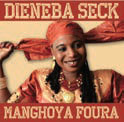Manghoua Foura
Author: Clyde Macfarlane
View album and artist detailsAlbum and Artist Details
Artist/band: |
Diénéba Seek |
Label: |
Sterns |
Magazine Review Date: |
October/2012 |
The Wassoulou region of southern Mali has an incredible record for producing great female singers. They were celebrated with Sterns’ The Wassoulou Sound – Women of Mali compilations, where Diénéba Seck got her first Western exposure with ‘Kankeletigui’. Manghoua Fouraya, Seck’s second studio album, continues in the style that made ‘Kankeletigui’ a pro¬democracy anthem for Mali. Seck’s trademark is her adoption of the flute, an Indian import that gives her music a distinctly Bollywood feel. Manghoua Fouraya is reflectively energetic, optimistic and irresistibly danceable.
Like fellow Wassoulou singers Oumou Sangaré and Fatoumata Diawara, Seck tackles social, political and women’s rights issues in her lyrics. Unlike Diawara, Seck is accompanied by a traditional ngoni (six-stringed harp/lute) instead of a guitar; this album comes across as a much purer example of the Wassoulou sound than Diawara’s hugely successful Fatou. ‘Djene Dakan’, probably the best song on the album, is stripped at several points to a beautifully sparse ngoni and hand-claps backbone. A big appeal of the album is Seck’s voice, which has a rich, undulating determination to rival any of her great Wassoulou counterparts. While her lyrical themes will fall on deaf ears for her Western audience, this cross-cultural shout of feminine pride is nevertheless essential. Diénéba Seck’s passion perfectly matches the Bollywood musical connection – a fusion that works on every track.

